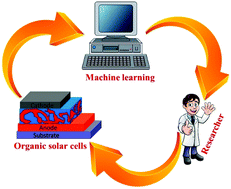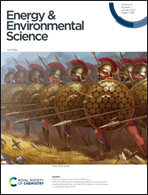Machine learning for high performance organic solar cells: current scenario and future prospects
Abstract
Machine learning (ML) is a field of computer science that uses algorithms and techniques for automating solutions to complex problems that are hard to program using conventional programming methods. Owing to the chemical versatility of organic building blocks, a large number of organic semi-conductors have been used for organic solar cells. Selecting a suitable organic semi-conductor is like searching for a needle in a haystack. Data-driven science, the fourth paradigm of science, has the potential to guide experimentalists to discover and develop new high-performance materials. The last decade has seen impressive progress in materials informatics and data science; however, data-driven molecular design of organic solar cell materials is still challenging. The data-analysis capability of machine learning methods is well known. This review is written about the use of machine learning methods for organic solar cell research. In this review, we have outlined the basics of machine learning and common procedures for applying machine learning. A brief introduction on different classes of machine learning algorithms as well as related software and tools is provided. Then, the current research status of machine learning in organic solar cells is reviewed. We have discussed the challenges in anticipating the data driven material design, such as the complexity metric of organic solar cells, diversity of chemical structures and necessary programming ability. We have also proposed some suggestions that can enhance the usefulness of machine learning for organic solar cell research enterprises.



 Please wait while we load your content...
Please wait while we load your content...